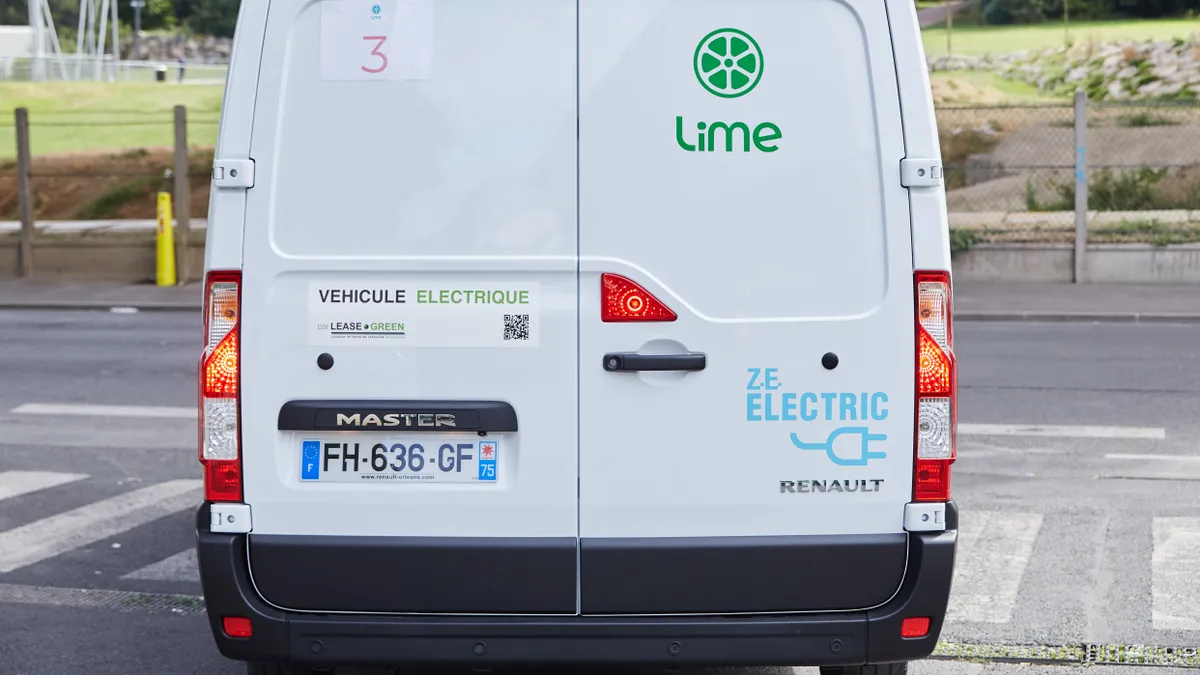Dive Brief:
- Lime and the World Wildlife Fund (WWF) announced Thursday a global partnership to promote cleaner transportation modes and reduce carbon emissions.
- The Ride Green initiative will support education campaigns to increase the public awareness of transportation's impact on air pollution. The pair will also launch a joint advocacy effort that calls for "reducing climate pollution, expanding mobility options and creating safer streets." The joint initiative will begin in more than a dozen countries internationally, including the United States.
- Alongside the partnership, Lime announced that it has voluntarily set a science-based climate target to meet the emissions reductions goals of the Paris climate accord. As part of that effort, the company said it will transition its operations fleet to electric vehicles (EVs) by 2021 in Europe and by 2023 globally, and power its offices and warehouses with 100% renewable energy.
Dive Insight:
Perhaps the most significant aspect of this partnership could be the prioritization of educational information for riders. This information, which will build off existing rider safety guidance, can be shared in the Lime app and through its other communications channels like social media and emails.
Lime CEO Wayne Ting said the new advocacy efforts could include calls for donations to relevant environmental causes, and encouragement to support drivers' transitions from cars to more sustainable transportation methods. These priorities have become amplified amid the coronavirus (COVID-19) pandemic, Ting said.
"I think that there's going to be so much opportunity," Ting said. "[We] can use [the app] to talk about things that matter to us… We talk about the commitment and the importance of this crisis every single week, every single day, because it matters to us. We're going to use that to further educate people who may not be using the app at the time."
COVID-19 and the resulting reduction of vehicle miles traveled has highlighted what can be done if people are encouraged to move away from cars, said Jennifer Lenhart, WWF's Global Lead for Cities. The air quality in many cities improved noticeably as most people switched to remote work and did not need to commute. Lenhart said that shift illustrates what can be done if cleaner transportation alternatives are available to drive emissions reductions.
"When we get people out of cars, there is a huge potential for cleaning the air in our city," Lenhart said. "[We] don't want to advocate for these sorts of globally halting solutions that have been so devastating in our cities. But we do want to take this moment to rethink and build back better. And a lot of that comes to how we move around our cities, how we interact in our cities, how we plan our cities."
The pandemic has also prompted cities to rethink how their streets are designed, including whether some should be made "car-free" to allow more cycling and other socially-distanced activities, such as outdoor dining. Ting and Lenhart agreed it will be imperative to continue this shift away from car-centric designs as the U.S. recovers from COVID-19.
"What if we didn't need as many cars? How can we create new mini parks or parklets or closed down some streets and turn them into outdoor dining? These different ideas could happen if we actually turn this moment to re-envision how we move around in our cities," Lenhart said.
In advocating for changes to street design and infrastructure, Lime's VP of Sustainability Andrew Savage said bringing together the company’s ridership with the heft of WWF’s decades-long experience in the advocacy space could be an effective way to bring about real change. That joint effort will include leveraging the just-launched Lime Action program, which helps riders connect with organizations in a variety of advocacy fields.
"The more voices advocating for similar priorities, the better," Savage said. "We know that cities are limited in their resources to make these types of choices, and we think an alignment of the business community and the advocacy community is a really strong alignment and sends a really strong signal about what the future of cities and mobility should be."
Lime’s climate pledge — which is more aggressive than a commitment it made earlier this year for all operational fleet vehicles be zero emissions by 2030 — is part of what Ting described as a "top-to-bottom review of operations" for the company as it looks to be carbon neutral.
That includes areas like ensuring scooters are designed in a more robust and sustainable way; electrifying its fleet vehicles; relying more on renewable energy; decarbonizing the supply chain and not relying on carbon offsets to make up any shortfalls in hitting their targets. Under its pledge, Lime also will be required to submit an annual report on its decarbonization efforts.
Ting said is imperative for other micromobility companies to follow its lead in the fight against climate change.
"I think when we looked at what other companies have put out there, one of the questions we have is, we want to go above and beyond," Ting said. "[Every] company has a responsibility and it starts with ourselves."












